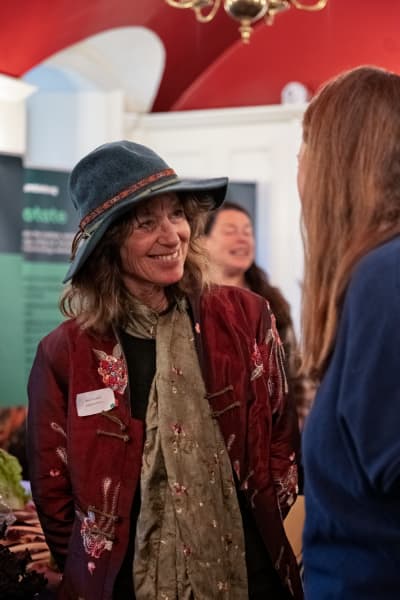The Oxford Real Farming Conference was back with a bang at the start of January - after a couple of years online only - and the energy and enthusiasm of being back together in-person was evident.
The ORFC is known as the radical gathering of food producers, farmers and growers, policy makers, researchers and activists, all committed to transforming our food system from the ground up. It’s a cornerstone in the calendar for many; a place to share progressive ideas on everything from farm practice to food sovereignty, land justice to farming policy, food politics to land-based traditions and knowledge.
In the closing plenary, one speaker summarised that the mood of this year’s conference was of impatience for change, alongside solidarity and warm reinforcement. She mentioned that “the ground feels more fertile for change” and certainly many of the sessions covered ideas around ways in which transitions to the global food system must happen – and now! – particularly given recent events such as Brexit, the global pandemic, and the war in Ukraine. Events which have all had undeniable effects on global supply chains.
Given the fragile global market, there were several sessions focusing on food sovereignty and food security. Tim Lang’s session asked Should the UK grow more food? The answer, he says, is yes but we should be careful about growing the right type of food and not at any cost. Growing more food per se will not increase food security if we continue to grow commercial crops that are traded on global markets. He thought that an increase in growing needs to be accompanied by a clear plan that focuses on what we grow, where and how, for example by growing a diversity of crops, not more cash crops. The session also highlighted the need for policy, and financial systems and instruments that can effectively finance a transition to a more just and sustainable agriculture system - a theme explored in more detail in the session on How can investment and finance decisions be aligned with a transition to agroecology.
One issue that GFO and many others are interested in exploring more deeply is the issue of cost. Unfortunately the current reality is that organic, locally grown food is often too costly – or at least not the priority - for many people. The session on Bridging the gap between sustainable farming and low income communities covered this topic, and speakers from Sustain, Growing Communities and Alexandra Rose agreed that we have to build a bridge between healthy affordable food and climate friendly diets. One way in which to do this is to overcome the four challenges to eating healthily and sustainably; Access, Affordability, Acceptability and Awareness. Some solutions suggested in this session were food vouchers such as the Alex Rose Vouchers, low cost meal kits, solidarity models and pay-it-forward measures.
Some other highlights included Growing in common ground, what’s needed to make the united visions of organic, regenerative and agro-ecological flourish? This session showed that we need smart ways to feed the world and more recognition that the current food system is broken, but that might start with a clearer vision of the best way to farm in the UK as there still seems to be a division between regenerative and organic farming.
The session on Why convert to Community Supported Agriculture? showcased how CSA’s can change people’s relationship to food, and can enrich farms and connect them to new customers. However there are barriers such as access to land, a lack of community interest, and a shortfall in available workers.
Farmer connections: A food partnership approach (close to our own heart) showcased the success of Good Food Leicestershire. Through their efforts on making school meals more sustainable they have ensured that 75% dishes across schools in Leicestershire are freshly prepared, 20% contain less meat and 15% are organic. An incredible step forward and an example of how food partnerships can campaign for change.
Another session looking at sustainable diets, and especially reducing meat intake: What is at steak: The role of livestock and alternative proteins to build sustainable diets looked at the likelihood and desirability of four possible outcomes including, at the most extreme end, with meat being replaced entirely by alternative proteins. We’re not sure there was an agreement reached but it was interesting to pull these different options apart!
What is the role of community food businesses in delivering social impact and social change showed how businesses can use a social impact toolkit to measure social impact such as health outcomes, community impact and livelihoods. St Werburghs Farm in Bristol shared their Equity and diversity audit – how they are exploring barriers to participation for diverse communities.
Local food economies: how do we join the dots? Highlighted how a co-op of bakers in Nottingham are successful and now offer a wider choice for the customer and offer an incubator for other small businesses.
And there were many many more sessions, workshops and conversations, which sadly we were not able to join. Luckily the online content is available to view here.
Lastly, each year at the ORFC Good Food Oxfordshire bring together our network of farmers and growers together over an informal drink, to chat and connect on similar issues and to share ideas for collaborative work. This year we really enjoyed connecting again with familiar faces, and meeting some new ones. We shared some upcoming GFO events and areas of work; for example a new supplier directory for producers in Oxfordshire, an upcoming networking meeting for landowners and growers, and a supplier dinner to showcase some of the incredible local suppliers and to connect producers and institutional buyers such as school and college catering teams and chefs.
If you’d like to find out more about our network of sustainable farmers, growers and other local producers do check out our website here.



